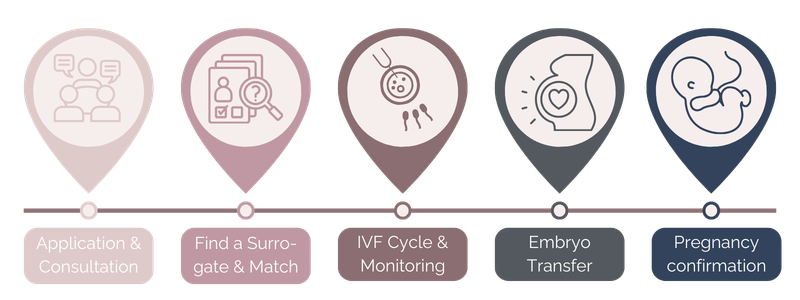IVF vs. Surrogacy: What’s the Difference?
While IVF and surrogacy are often mentioned together, they are not the same thing.
In vitro fertilization (IVF) is a fertility treatment where a woman’s egg is fertilized outside her body in a lab with her partner’s sperm or a sperm donor and the embryo (fertilized egg) created as a result is then placed in the woman’s uterus. (see more in FAQ section)
IVF treatment can be used by individuals or couples trying to conceive:
- on their own. In this case, the embryo is transferred to the mother’s uterus, and she carries and delivers the baby. Parents often use their own egg/sperm (or sometimes (a) donor(s), depending on their fertility situation)
- with a surrogate. In this case, the embryo is transferred to a surrogate and the surrogate carries and delivers the baby for the intended parents.

As a result, surrogacy is the arrangement where a surrogate (gestational carrier) carries the pregnancy. IVF is often the medical process used to achieve this pregnancy through gestational surrogacy.
In other words, IVF is only one step in the larger gestational surrogacy process when intended parents cannot/do not carry a child themselves.
IVF vs Surrogacy: What is the Cost Difference?
IVF Alone
$8,000 – $30,000
Depending on the number of IVF cycles, and if the parents are using their own genetic material or donors.
Surrogacy
$100,000 - $200,000*
of which, $8,000 – $30,000 of the cost is related to IVF treatment and the other costs cover surrogate compensation and expenses, insurance and other fees (agency, legal).
IVF alone | Surrogacy |
$8,000 – $30,000 Depending on the number of IVF cycles, and if the parents are using their own genetic material or donors. | $100,000 – $200,000* of which, $8,000 – $30,000 of the cost is related to IVF treatment and the other costs cover surrogate compensation and expenses, insurance and other fees (agency, legal). |
* You can find a full overview of the costs involved in surrogacy here as well as generate a detailed cost estimate for your own situation using the surrogacy cost calculator.
What is IVF surrogacy?
IVF surrogacy is a family-building method that combines in vitro fertilization (IVF) with gestational surrogacy.
In gestational surrogacy, unlike in traditional surrogacy, embryos are created in a lab using the eggs and sperm of the intended parents (or donors) and then transferred into a surrogate’s uterus.
The surrogate carries the pregnancy, but she has no genetic link to the child. Besides enabling intended parents to have a genetic connection with their child, this helps the legal process (parental rights) and create for them a straightforward path to becoming a parent.
Who is IVF surrogacy for?
- Intended parents, intended single mothers, intended same-sex mothers who cannot safely carry a pregnancy
- Same-sex male couples
- Intended single fathers
When to turn to IVF surrogacy to have a baby?
- After multiple rounds of IVF have failed to produce a viable fetus
- When you are unable to conceive or carry a pregnancy safely for whatever reason
IVF with a Surrogate and Egg Donor
Some journeys involve both a surrogate and an egg donor.
In this case:
- The egg donor provides the eggs, which are fertilized in the lab
- The resulting embryos are transferred to the surrogate
- Neither the donor nor the surrogate is genetically related to each other or the baby
This path is commonly chosen by:
- Intended parents without viable eggs
- Same-sex male couples
- Single fathers
Surrogate Story:
As A Single Intended Mother, She was seeking to create a family in her own terms.
"Doing this as a single parent is daunting, and I still hope that I will eventually find a partner to share in the journey, but it is a journey that I wanted to take regardless of having a partner. Embrace the journey and know that there are people and resources to help you achieve your dream!
Don’t get overwhelmed! If you take small steps in understanding and finding the right partners to assist you, it’s a manageable and exciting experience. If you are like me and have listened to your heart, you will be confident that you are making the right decision. It’s worth it!"

IVF Surrogacy Process: Step-by-Step Timeline
The IVF surrogacy journey involves both medical and legal milestones. Here’s a simplified timeline for intended parents:

1. Application & Consultation
- Application for intended parents
- Gather information, setting your own requirements, communicate preferences based on your requirements and values
- Initial consultation with a fertility clinic and surrogacy agency
2. Find a Surrogate & Match
- Match with a qualified surrogate through a trusted agency
- Legal contracts are created and signed
- Psychological evaluation & background check
Learn more about how to find the right surrogate in our How to Find a Surrogate article, and explore the full journey in our Surrogacy Process Guide.
3. IVF Cycle and Monitoring
- Ovarian stimulation and egg retrieval from the intended mother or egg donor
- Sperm collection and fertilization in the lab
- Embryo development and testing (if applicable)
4. Embryo Transfer
- Embryo is transferred into the surrogate’s uterus
- Luteal support and rest recommended for optimal conditions
5. Confirmation of Pregnancy
- Blood test confirms pregnancy approximately 10 days after transfer
- Ultrasound follows to verify fetal heartbeat
6. Pre Birth or Post-Birth Orders
- Agency Monitoring continues to update Intended Parents regularly
- Pre-birth order begins (depending on state) around 14 weeks into the pregnancy while some states use post-birth orders instead
7. Delivery and Postpartum
- If intended parents cannot attend due to travel delays, emergencies and restrictions, the agency ensure a legally responsible representative is present.
- Intended parents are assisted while adjusting to newborn care, sleep deprivation (for some) and a major life transition
How SurrogateFirst Can Help
SurrogateFirst offers hands-on support at every stage of the IVF surrogacy journey. From matching with a compassionate, pre-screened surrogate to coordinating with fertility clinics and managing the IVF timeline, we make the process as smooth and transparent as possible. We also assist with legal coordination, insurance review, and emotional support, because building a family should feel supported every step of the way.
IVF Surrogacy FAQs
Who Qualifies for IVF Surrogacy?
IVF Surrogacy is often chosen when pregnancy is not medically safe or physically possible but the desire to have a biological child remains strong. At SurrogateFirst, we work with intended parents from different backgrounds who share one goal: building their family with the right support and care. If carrying a pregnancy yourself is not an option, surrogacy may provide a safe and reliable path forward.
You can qualify for IVF Surrogacy if you are:
- An intended mother who has experienced difficulty in carrying a pregnancy to term
- Born without a uterus or without a uterine conditions that prevent pregnancy
- Someone who had a hysterectomy
- Facing multiple unsuccessful IVF cycles
- Managing health conditions or taking medications that make pregnancy unsafe
- A single father wanting to pursue parenthood
IVF clinics with high success rates for surrogacy cycles?
Clinics that handle IVF surrogacy cases regularly bring the right experience, technology and care to each cycle. With skilled doctors and systems designed specifically for gestational carriers, families often see higher success rates and a smoother journey overall.
Who is the biological mother of an IVF baby?
The biological mother of an IVF baby is the woman whose egg is used to create the embryo. This may be the intended mother or an egg donor. The gestational carrier or surrogate does not share genetic connection to the baby.
Does IVF always involve a surrogate?
No. IVF can be carried by the intended parents on their own or a surrogate can carry the embryo for them on a case per case basis. Gestational surrogacy however commonly IVF as the main medical protocol.
What Are the Risks of IVF Surrogacy?
IVF surrogacy involves several types of risks. According to the American Society for Reproductive Medicine, the most common categories include physical health risks related to pregnancy and medical treatments, emotional or psychological risks linked to the surrogacy experience, and social or relationship risks that can affect the surrogate, intended parents, and family dynamics.
However, with proper medical screening, counseling, and professional support, surrogacy is widely considered a safe and well-managed process for most participants.
What is In Vitro Fertilization (IVF)?
According to the American Society for Reproductive Medicine (ASRM), In vitro fertilization, or IVF, is a fertility treatment where eggs and sperm are combined in a lab to create embryos. Once an embryo forms, it is placed onto the uterus to start a pregnancy. IVF helps many families who cannot conceive naturally.
About SurrogateFirst
SurrogateFirst is a boutique surrogate agency specializing in quickly matching intended parents around the world with our fully-vetted, exceptional surrogates.
We help individuals and couples, regardless of race or sexual orientation, build their families through the miracle of surrogacy.
Every team member at SurrogateFirst is either a former intended parent or an experienced surrogate herself. We also have first-hand knowledge of what it takes to have an incredible, successful surrogate journey.





